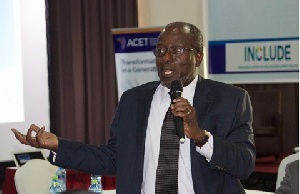Chief Economist at the African Center for Economic Transformation (ACET), Dr. Yaw Ansu has urged politicians not to use issues related to youth unemployment for propaganda ahead of the November polls.
Dr. Ansu made the call during the first of two national policy dialogues on youth employment challenges in Ghana organized by ACET and INCLUDE, a Dutch research firm, yesterday in Accra.
According to him, as the crucial November 7 polls draw closer, it was necessary for each political party to come out clearly and explain to the masses how it intends to tactically solve the problem of youth unemployment when elected into office.
Dr. Ansu explained that it was important for the nation to give the youth the right skills, create the right policies that could create jobs or enable them to create jobs for themselves to ensure a bright future.
‘Unemployment Affects Everyone’
Christabel Dadzie, a social protection specialist at the World Bank, said the problem of youth unemployment affects not just those who cannot find a job, adding that it was one of the main impediments to developing Ghana’s economy.
Ms. Dadzie added that the issue was not unique to Ghana, adding that authorities lack effective solutions to addressing unemployment in Ghana.
Major Issues
In Ghana, those between the ages of 15 and 35 are classified as youthful.
According to Dr. William Baah-Boateng, a senior research fellow at ACET, the youth population had grown considerably in Ghana to current encompass more than a third of the total population.
One of the main sources of youth unemployment, he said, was the fact that the number of jobs available could not support the growing influx of youth workers.
According to data from the 2014 Integrated Business Enterprise Survey, 400,000 new workers, presumably youth, entered the market that year, but only 207,000 new jobs were created.
Dr. Baah-Boateng said a major point of confusion is trending in youth unemployment.
He cited the Ghana Living Standards Survey (GLSS) that showed a drop in unemployment from 12 percent in 2000 to 8 percent in 2013.
The jobless population of youth rose from 24.7 percent in 2010 to 25.8 percent in 2013.
Better Education
Meanwhile, Eben Anuwa-Amarh, Commissioner of the NDPC, highlighted the failures of the Ghanaian education system to prepare students for jobs.
He, therefore, emphasized the need to improve quality and accessibility of education, especially third-level education to keep up with changes in the labour front.
General News of Thursday, 14 July 2016
Source: dailyguideafrica.com

















